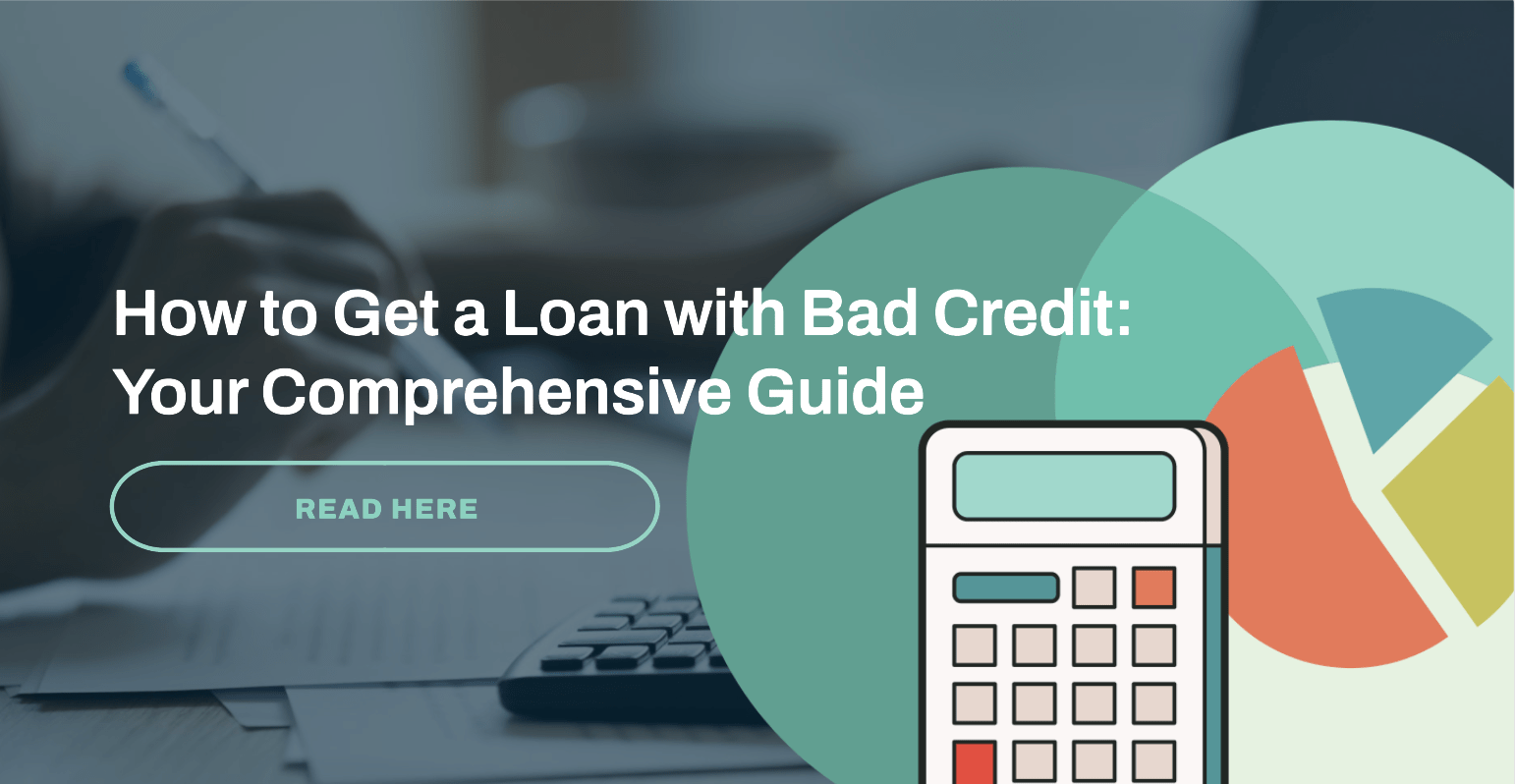In today’s world, having access to credit can be really important when you need financial help. Whether you want to start a business, pay off debts, or cover unexpected expenses, getting a loan can provide the money you need. But what if you have bad credit? Don’t worry! This guide is here to help high school students like you understand how to get a loan even if you have bad credit.
Having bad credit doesn’t mean you have no options. While traditional lenders may be hesitant to give loans to people with a not-so-great credit history, there are still ways for you to get a loan. In this blog, we’ll break down the process so you can understand how to get a loan with bad credit.
Together, we’ll help you make smart financial decisions and pave the way for a better and more secure future. Let’s dig in!
What is a Bad Credit?

Bad credit refers to a situation where an individual has a history of not managing their credit obligations responsibly. It typically arises from a combination of factors such as late payments, high levels of debt, loan defaults, or bankruptcy. When you have bad credit, it indicates to lenders that you may be a higher risk borrower, as your past financial behavior suggests a higher likelihood of defaulting on loan repayments.
In the UAE, a bad credit score is generally considered to be between 300 and 619. This range is determined by the Al Etihad Credit Bureau (AECB), the official body responsible for credit reporting in the UAE. Here’s a breakdown of the typical credit score ranges:
- 300 to 619: Bad credit score
- 620 to 679: Fair credit score
- 680 to 730: Good credit score
- 731 and above: Excellent credit score
The impact of bad credit on your ability to borrow money is significant. Lenders, such as banks or credit unions, use your credit history to assess your creditworthiness and determine the level of risk they would be taking by lending you money.
A low credit score resulting from bad credit can lead to several consequences:
Limited Loan Options
Traditional lenders may be hesitant to approve your loan application because they consider you a higher risk borrower. This can restrict your access to certain loan products or result in higher interest rates and stricter terms if you are approved.
Higher Interest Rates
If you manage to secure a loan with bad credit, lenders may charge higher interest rates to compensate for the perceived risk. This means you’ll end up paying more in interest over the life of the loan compared to someone with good credit.
Stricter Terms and Conditions
Lenders may impose stricter terms and conditions on loans for individuals with bad credit. This could include shorter repayment periods, larger down payments, or collateral requirements to mitigate their risk.
Difficulty in Getting Approved
It can be more challenging to get approved for loans, especially unsecured loans, when you have bad credit. Lenders may view you as a higher risk and may be less willing to extend credit to you.
Impact on Future Financial Opportunities
Bad credit not only affects your ability to get a loan but also impacts other financial opportunities. It can make it harder to rent an apartment, obtain a credit card, or secure favorable insurance rates. Even future employers may consider credit history as part of their hiring process.
How to Get Loans in UAE with Bad Credit

Getting a loan with bad credit can be challenging, especially in the context of the UAE. However, there are steps you can take to improve your chances of getting approved.
Know Your Credit Score
Obtain a copy of your credit report from the UAE’s credit reporting agencies, such as Al Etihad Credit Bureau. Review your credit score and thoroughly understand the factors that have contributed to your bad credit.
This includes examining your payment history, outstanding debts, and any defaults or delinquencies. By gaining insight into your credit profile, you can identify areas for improvement and understand how lenders may perceive your creditworthiness.
Research Lenders
In the UAE, it’s essential to research lenders who specialize in providing bad credit personal loans. Look for financial institutions that have programs or products specifically tailored for borrowers with less-than-perfect credit histories.
These lenders may have more flexible eligibility criteria and be more willing to consider your loan application. Online lenders like CashNow and some smaller banks could be viable options to explore.
Consider Secured Loans
Secured loans can be a viable option for individuals with bad credit in the UAE. These loans require collateral, such as a car, property, or savings account. By providing collateral, you reduce the lender’s risk, as they can seize the collateral if you default on the loan. FAB bank offers secured loans, check them here.
This reduction in risk may increase your chances of approval and potentially result in more favorable interest rates and terms compared to unsecured loans.
Explore Cosigners or Guarantors
If possible, consider finding a cosigner or guarantor with good credit. A cosigner or guarantor is someone who agrees to take responsibility for repaying the loan if you’re unable to do so.
Having a cosigner or guarantor with a strong credit history can significantly enhance your loan application. Lenders will assess their creditworthiness alongside yours, potentially increasing your chances of approval and improving the terms offered to you.
Build a Strong Application
When applying for a loan, it’s crucial to present a comprehensive and compelling application package. Provide detailed information about your income, employment history, and any assets you own.
Emphasise stability and your ability to repay the loan. Include supporting documentation, such as pay stubs or bank statements, to demonstrate your financial position. By showcasing your financial stability and commitment to meeting your obligations, you can offset some concerns associated with bad credit.
Explain Your Situation
If there are legitimate reasons for your bad credit, such as unexpected medical expenses, job loss, or other extenuating circumstances, consider writing a letter of explanation to accompany your loan application. Clearly communicate the circumstances that led to your credit challenges and highlight any steps you have taken to improve your financial situation.
Providing context and showing a proactive approach to addressing your credit issues may help lenders better understand your situation and increase the chances of approval.
Improve Your Credit
Although it may take time, working on improving your credit score is crucial for future borrowing opportunities. Make timely payments on your existing debts, reduce your overall debt burden, and keep your credit utilization low.
Paying attention to these positive financial habits over time will gradually improve your creditworthiness and increase your chances of obtaining loans on more favorable terms in the future.
Be Prepared for Higher Costs
Loans for individuals with bad credit in the UAE often come with higher interest rates and fees. It’s crucial to compare different lenders and loan offers to ensure you’re getting the best possible terms available to you.
Consider the overall cost of borrowing, including interest rates, processing fees, and any other charges associated with the loan. Assess whether the loan is affordable for you and fits within your budget, taking into account the higher costs associated with your credit situation.
Valuable Tips to Improve Bad Credit
Building a Positive Payment History
- This is the single most important factor impacting your score. Make on-time payments for all your bills, including rent, utilities, phone, and credit cards. Even minor delinquencies can significantly damage your score.
- Set up automatic payments or reminders to ensure you never miss a due date.
- Consider paying down balances before the statement closes to keep your credit utilization ratio low. Aim for under 30% of your credit limit on each card.
Managing Debt
- Focus on paying down high-interest debt first. This will save you money on interest charges and free up funds for other payments.
- Develop a debt management plan. Create a budget and allocate funds towards debt repayment while still covering essential expenses.
- Explore debt consolidation options if you have multiple debts with high-interest rates. This can simplify your payments and potentially lower your overall interest rate.
Building and Maintaining Credit
- If you have limited credit history, consider getting a secured credit card. This requires a security deposit but helps establish your creditworthiness with responsible use.
- Become an authorised user on a friend or family member’s account with good standing. This can add a positive credit history to your report.
- Only apply for new credit when necessary. Each application triggers a “hard inquiry” that can temporarily lower your score.
Additional Tips
- Obtain your free credit reports regularly and dispute any errors. Seek help from credit counselling agencies if needed. They can provide guidance and support in managing your debt and improving your credit score.
FAQs
What is the minimum credit score to get a loan in UAE?
To be eligible for a personal loan in the United Arab Emirates, it is generally required to have a minimum credit score of 580. However, it’s important to understand that higher credit scores can provide access to more favourable loan terms and lower interest rates.
Can I get a loan if my credit is bad?
Although it is possible to obtain a loan with bad credit, it is crucial to understand that such loans typically come with higher costs. Unless you are in need of an emergency loan, it may be beneficial to prioritise improving your credit before seeking to borrow money. Transitioning from a bad credit score to an excellent one can be a gradual process that may take several months or even years.
What are the main factors lenders consider besides credit score?
Lenders assess loan eligibility based on various factors, including your Debt-to-income ratio (DTI). This measures your monthly debt payments compared to your income. Lower DTI is better. They will also look at stable employment with consistent income to improve your chances.
Lenders might also prefer certain loan purposes like home improvement over debt consolidation.
What are the potential risks of getting a loan with bad credit?
Higher interest rates can significantly increase your loan repayment costs. Carefully assess the affordability before committing. Additionally, some predatory lenders might exploit your situation with unfair terms, so be cautious and choose reputable lenders.


